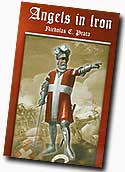 The word Crusader still evokes the idea of a perfect warrior. It calls to mind a human type, full of courage with neither reproach nor fear. It beckons one to an age in which Faith and honor held precedence over pleasure and comfort. These ideas were resplendent at the Siege of Malta in 1565, the theme of Nicholas Prata’s book: Angels in Iron.
The word Crusader still evokes the idea of a perfect warrior. It calls to mind a human type, full of courage with neither reproach nor fear. It beckons one to an age in which Faith and honor held precedence over pleasure and comfort. These ideas were resplendent at the Siege of Malta in 1565, the theme of Nicholas Prata’s book: Angels in Iron.
Nowhere in history was this almost mythical concept of a Crusader better fleshed out than in the orders of chivalry. These monk-warriors struck fear and even admiration in the hearts of their enemies, provoking the Moslem chronicler Imad-in-Din to dub the Knights of St. John, “…wicked Hospitallers, each full of zeal and without weakness.”
The action of the orders of chivalry rarely shone brighter than through the actions of the Hospitallers at the Siege of Malta in 1565. At that time Suleiman the Lawgiver, one of the greatest emperors of the Ottoman Empire, invaded Malta, hoping to eradicate the Hospitallers and use the island as a staging point for an invasion of Italy. He hoped to conquer Rome and build a mosque in the Eternal City. The island stronghold was expected to hold out no longer than a couple of weeks.
Outnumbered over four to one, with insufficient fortresses and greatly outgunned, the knights held their ground for almost four months,eventually forcing the Turks to quit the island, leaving behind 30,000 dead.
Nicholas Prata follows the blow-by-blow details of this siege in his gripping historic novel, Angels in Iron, available from ARX Publishing.
Dedication and Victory
The book focuses a great deal on fictionalized characters, yet maintains historic accuracy. This allowed Mr. Prata to bring the dedication of each individual knight (as well as the Maltese combatants) to the forefront, a detail which while purely historic works leave entirely to the imagination. After reading this inspiring work, one is drawn to the inescapable conclusion that, above all, it was the knight’s abnegation for the Faith that led to victory.
Being a Hospitaller was not a 9-to-5 job. Each knight joined the order to offer their lives for an ideal, and they did not hesitate to make good on their offering.
This was exemplified at the Siege of Malta when the fort St. Elmo, shattered by weeks of relentless cannon fire, was on the verge of collapse. Grand Master Jean La Valette, knowing the fort was of key importance to the survival of Malta, asked for volunteers to reinforce the battered garrison. Although the assignment meant certain death, he was flooded with volunteers.
Only a force of such men could be capable of the heroic feats that were commonplace during the siege. Yet, without such men, Malta certainly would not have survived the assault, Europe would have been invaded and the Christian way of life forever altered.
While the use of fiction allows Mr. Prata to bring such elements into focus, he often portrays the knight-monks in a way that hardly seems realistic. For example, his fictional knights use rough language and one even speaks briefly of longing for a woman he left before joining the order. The conversation is not graphic, but highly unlikely and unnecessary.
A Lesson from Malta
Thus, the TFP recommends Nicholas Prata’s Angels in Iron with reservations about its unrealistic portrayal of the knights. The story is engaging and inspiring. Not only will its non-stop action keep you on the edge of your seat, but it exemplifies the virtue of abnegation, so necessary for faithful Catholics in these trying times.
Angels in Iron
By Nicholas C. Prata
Paperback – 313 pages (2004)
ARX Publishing, Bristol, Penn.;
ISBN: 1-889758-56-6
$16.95
